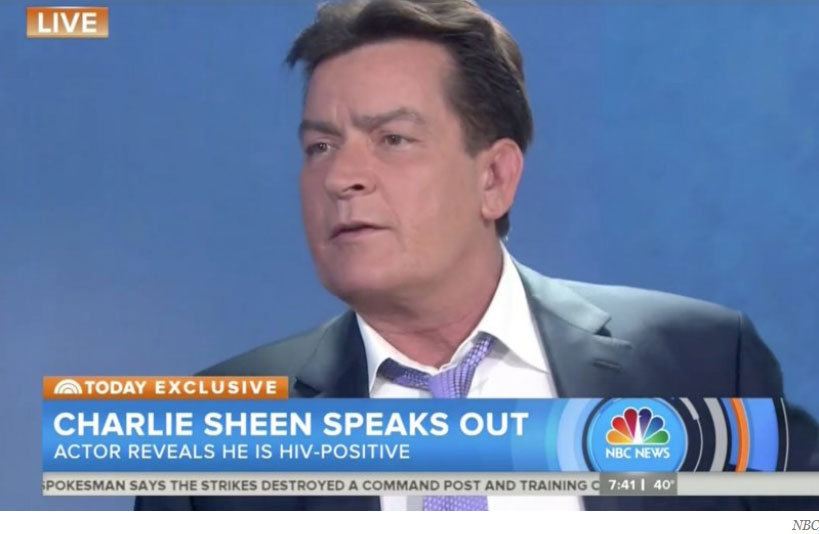Hollywood Star Charlie Sheen Has HIV

With the virus under control, Sheen says it’s time to take responsibility and help others.
The wild side finally caught up with Hollywood bad boy and mercurial rebel Charlie Sheen: He is HIV positive. Sheen, star of the movie “Major League” and the TV show “Two and a Half Men,” told NBC’s Matt Lauer this morning on Today.
“I’m here to admit that I am in fact HIV positive. And, I have to put a stop to this onslaught, this barrage of attacks, of sub-truths, and very harmful stories that are about threatening the health of so many others, which couldn’t be farther from the truth,” Sheen said. Rumors of an unnamed major Hollywood star being HIV positive had circulated the internet this month. Insiders say they knew it was Sheen for weeks.
RELATED TOPIC: Curing Cancer and HIV May Be Linked
Sheen, 50, said he was diagnosed after suffering from headaches and night sweats. “I thought I had a brain tumor. After a battery of tests … they walked in the room and said, ‘Here’s what’s going on.’ It’s a hard three letters to absorb. It’s a turning point in one’s life.”
For years, Sheen had reveled in his bad-boy notoriety. He’s acknowledged extensive drug use and sex with prostitutes, after a drug-fueled public meltdown forced CBS to shut down production of “Two and a Half Men.” Sheen, however, says he doesn’t know how he contracted the infection.
Sheen’s doctor, Robert Huizenga, joined him during part of the interview. Huizenga, an associate professor of clinical medicine at the University of California, Los Angeles, said that Sheen has been on treatment since his diagnosis. The treatment has suppressed the virus, Sheen has an undetectable level of the virus in his blood, and he is “absolutely healthy,” Huizenga said.
Sheen joins former NBA star Ervin “Magic” Johnson as a major public figure with HIV. The virus in Johnson, diagnosed in 1991, has not progressed to the life-threatening disease AIDS. Actor Rock Hudson, singer Freddie Mercury, and tennis star Arthur Ashe all have died of AIDS.
HIV kills or impairs the cells of your immune system and progressively destroys your body’s ability to fight infection and certain cancers. It’s typically spread by sexual contact with an infected partner and through intravenous drug use. Some people develop a flu-like illness within a month of exposure to the HIV virus, but many people do not develop any symptoms until long after they’ve become infected. In some, symptoms do not develop at all, or symptoms may appear and disappear, often being mistaken for those of another viral infection.
More than 1.2 million people in the U.S. are living with HIV infection; almost 1 in 8 don’t know they are infected, according to the Centers for Disease Control and Prevention (CDC). HIV most seriously affects gay and bisexual men, but promiscuity has been linked to contracting the virus as well. While few population-based studies have been done to assess numbers of HIV in sex workers, the risk is high, the CDC says.
Early detection of HIV is important for slowing progression of the virus with anti-viral drug treatment, although HIV antibodies, proteins in your blood that your immune system make to defend against infection, often do not reach levels high enough to detect by standard blood tests until one to two months after infection.
While there is no cure for HIV, many people have been living for years, like Johnson, with antiviral drug treatment. Researchers say a new HIV prevention pill is dramatically effective against the spread of the virus, but critics have called the pill a “party drug” that encourages risky sex.
Sheen said he’s not going to be a “poster boy” for HIV prevention. “But I will not shun away from my responsibilities and opportunities that drive me to helping others, and delivering a cure.”
“People do stupid things – that’s what spreads HIV,” says epidemiologist Elizabeth Pisani, director of Ternyata Ltd., a public health consultancy based in London, UK, who’s spent over a decade working on HIV and AIDS. She says education about how to prevent the spread of HIV infection is the rational way to combat the virus.
In many ways, AIDS and HIV aren’t talked about enough.
Updated:
November 17, 2015
Reviewed By:
Christopher Nystuen, MD